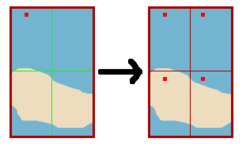Difference between revisions of "Half-graticule"
From Geohashing
imported>Zigdon (→Ramifications) |
imported>Phyzome (add {{alternate algorithm}}) |
||
| Line 2: | Line 2: | ||
[[Image:Half-grat.png|thumb|right|250px|Diagram of the approach]] | [[Image:Half-grat.png|thumb|right|250px|Diagram of the approach]] | ||
| + | |||
| + | {{Alternate algorithm}} | ||
== Details == | == Details == | ||
Revision as of 19:05, 12 June 2008
People in graticules or regions severely restricted by water might consider a modification to the algorithm that will still coincide with the standard coordinates.
Please avoid using alternatives to the official algorithm unless there is a compelling reason to do so in your locale.
- Alternative algorithms are appropriate for island regions or small countries without open borders. In such cases, please work towards a clear consensus with others in your graticule on the best alternative method for your region before establishing and publicising your local convention.
- By using an alternate algorithm where it is not appropriate, you effectively fragment your graticule, reducing the number of people who might come to the same meetup.
Details
- Take (a,b) as the standard decimal location.
- Take (c, d) = (a % 0.5, b % 0.5) as the half-size location. (% is the mod operator)
- New locations:
- (c, d)
- (c + 0.5, d)
- (c, d + 0.5)
- (c + 0.5, d + 0.5)
One of those is guaranteed to match (a, b), but one of the other three may be more accessible.
Ramifications
Would this lead to fragmenting of the geohash community? Perhaps not, since anyone using this technique would likely not be able to make it to the standard coordinates. This approach merely serves as a way of deterministically generating alternate meetup locations when the standard one is unreachable.
- Yes, but at the cost of reducing the potential people who might show up? I think using the suggestion system per graticule would make more sense, instead of an institutional solution. Zigdon 18:59, 12 June 2008 (UTC)
